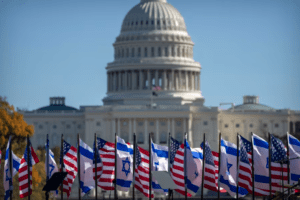 As part of our ongoing series centered on the Israel-Hamas conflict, this post will review the U.S. foreign policy decisions. Part 1 of the series focused on the effects of the conflict within U.S. borders and the rise of antisemitism and Islamophobia. To complete the series, Part 3 in the coming week will review how the conflict may impact the interests of the United States in the Middle East more broadly.
As part of our ongoing series centered on the Israel-Hamas conflict, this post will review the U.S. foreign policy decisions. Part 1 of the series focused on the effects of the conflict within U.S. borders and the rise of antisemitism and Islamophobia. To complete the series, Part 3 in the coming week will review how the conflict may impact the interests of the United States in the Middle East more broadly.
What Has the United States Already Done in the Israel-Hamas Conflict?
There is a long history of the U.S. supporting Israel through foreign aid. In fact, Israel is the largest cumulative recipient of U.S. foreign assistance since World War II. This has included between $3 billion and $5 billion in annual funding for military and missile defense spending since 2000.1
On October 20, 2023, President Joe Biden addressed the nation affirming the country’s commitment to its alliance with Israel. President Biden connected U.S. support for Israel in the fight against Hamas to support for Ukraine in repelling Russia’s invasion. In addition to accusing Iran of aiding both Hamas and Russia, President Biden argued that both conflicts represent struggles to preserve democracy. He also emphasized that Hamas must be destroyed, making a distinction between Hamas and the Palestinian people as a whole.2
Since the start of the conflict, the United States has positioned two Navy carrier groups in the Mediterranean Sea off the coast of Israel and the Biden administration has sought $14 billion in military aid for Israel. The administration has also helped negotiate the release of Israeli hostages during temporary truces and secured humanitarian aid for Palestinians in the Gaza Strip.3
At present, there is a ceasefire: Gaza is receiving some humanitarian aid, Hamas is releasing some of the hostages it holds, and Israel is releasing some Palestinian prisoners. This ceasefire was negotiated through Qatari intermediaries with support from the United States and other nations. The ceasefire is not permanent; it is currently scheduled to end by November 30.4
WATCH: President Biden Remarks on Temporary Truces to Exchange Prisoners
Strongly Supporting Israel’s Response
The standing policy of every U.S. administration since Israel’s founding in 1948 has been a commitment to Israel’s right to exist. The United States has provided billions of dollars in aid and sales of military equipment to Israel as well as engaged in mutually beneficial joint operations and strategic coordination between militaries and intelligence agencies. Hamas’ attack on Israel, which killed more than 1,200 Israelis, represents one of the most significant terror attacks in Israel’s history and U.S. support for Israel shows no signs of wavering. Both countries have aligned on two primary goals for the conflict: the release of all 240 Israeli hostages and the elimination of Hamas.5
While some officials in Congress and the Biden administration have called for a ceasefire, the majority of Congress and the White House have remained in alignment with Israeli Prime Minister Benjamin Netanyahu by publicly opposing any formal ceasefire.
Those who argue against a formal ceasefire lay out several reasons for their opposition. They argue that such a policy would hinder the efforts to destroy Hamas and simply provide the organization time to recover and rearm, ultimately prolonging the conflict. They note that Hamas continues to be dedicated to the death and destruction of Israel; thus, Israel should not be expected to agree to a ceasefire after the brutal attack on its citizens. They argue that a ceasefire would delay the return of the rest of the Israeli hostages held by Hamas, as Hamas would no longer feel the pressure of military raids coming from Israel. Underscoring the need to secure the release of all hostages, freed Israeli prisoners have given accounts of their time in Hamas captivity and suffering or witnessing inhumane treatment, including starvation, family separation, torture, and execution. And Israeli officials have voiced their suspicions of any ceasefire agreement, given Hamas’ history of violating past ceasefires.6
READ: A History of the Israel-Palestine Conflict
Conditional U.S. Support for Israel
While current levels of support for Israel among U.S. officials and the American public is high, there is a growing push for the United States to use its influence to bring the conflict to an end.7 Since the start of the conflict, nearly 15,000 Palestinians have died in the fighting and hundreds of thousands of Palestinians living in Gaza have been forced from their homes. Conditions in the Gaza Strip have deteriorated significantly, with many lacking adequate shelter, electricity, health care, food, and water.8 Additionally, as many of 1.7 million of the 2.3 million residents of Gaza have been displaced.9
Israel has come under increasing scrutiny from the international community, with some characterizing its tactics as indiscriminate or even accusing the country of war crimes. While these accusations are heavily politicized, international support for Israel has lessened as the conflict continues. Some 120 member countries of the United Nations have called for an immediate truce; notably, the United States and most of its European allies did not join this call.10
Criticism of U.S. support for Israel has even come under scrutiny within the State Department. The State Department makes a “dissent channel” available for staff to express their disagreement with official U.S. foreign policy. Normally, this channel is infrequently used, but it has seen significant volume since the start of the conflict, with participants questioning whether U.S. support for Israel is helping to create a humanitarian crisis in Gaza. Most prominently, Josh Paul, director of congressional and public affairs at the State Department Bureau of Political-Military Affairs, resigned in protest, publicly stating that he found the administration’s approach to the conflict to be “short-sighted, destructive, unjust,” and contrary to American values.11
Critics of the U.S. foreign policy decisions have pointed to the lack of a clear end goal beyond destroying Hamas. They question the absence of a plan for what will become of Gaza and its Palestinian population when the conflict resolves.12 Some suggestions for how the administration might alter its policies have included:
- Calls for an immediate and lasting ceasefire;
- A commitment to increase support for Israel’s defense;
- Prioritizing humanitarian aid for both Palestinians and Israelis;
- Only endorsing and supporting tactics which protect civilians and human rights; and,
- Having the United States act as a third-party to advance a political solution which will avoid future conflict.13
At present, while the Biden administration continues to caution Israel against unnecessary civilian casualties in Gaza, it has not significantly altered its policy of support for Israel.
Discussion Questions
- Do you agree or disagree with calls for a ceasefire in the Israel-Hamas conflict?
- Does the United States have the right to impose conditions on its support for its allies or is it important for allies to remain fully committed to each other’s policies?
- President Biden has argued that the conflict between Israel and Hamas represents similar stakes for democracy as the conflict between Ukraine and Russia. Do you agree or disagree?
Related Posts
- Teaching and Discussing the Israel-Hamas Conflict
- The Israel-Hamas War
- Conflict in Israel and the U.S. Response
As always, we encourage you to join the discussion with your comments or questions below.
Close Up is proud to be the nation’s leading nonprofit, civic education organization, working with schools and districts across the U.S. since 1971. If you would like to partner with us or learn more about our experiential learning programs, professional development, or curriculum design and consulting, contact us today!
Sources
Featured Image Credit: Dave Decker/Creative Loafing/Axios
[1] https://www.axios.com/2023/11/04/us-israel-aid-military-funding-chart; https://sgp.fas.org/crs/mideast/RL33222.pdf
[2] https://www.whitehouse.gov/briefing-room/speeches-remarks/2023/10/20/remarks-by-president-biden-on-the-unites-states-response-to-hamass-terrorist-attacks-against-israel-and-russias-ongoing-brutal-war-against-ukraine/
[3] https://www.brookings.edu/articles/bidens-dangerous-stance-on-the-war-in-israel-and-gaza/
[4] https://www.cnbc.com/2023/11/28/israel-hamas-war-live-updates-news-on-gaza-conflict.html
[5] https://www.reuters.com/world/middle-east/israel-revises-death-toll-oct-7-hamas-attack-around-1200-2023-11-10/; https://apnews.com/article/israel-hamas-11-1-2023-blinken-netanyahu-d57766fd8e55500ff6f16b78b3560d51
[6] https://www.atlanticcouncil.org/blogs/menasource/israel-hamas-ceasefire-hostages-gaza/; https://www.bbc.com/news/world-middle-east-67556006
[7] https://www.reuters.com/world/us-public-support-israel-drops-majority-backs-ceasefire-reutersipsos-2023-11-15/#:~:text=Some%2032%25%20of%20respondents%20in,conducted%20Oct.%2012%2D13.
[8] https://www.reuters.com/world/us-public-support-israel-drops-majority-backs-ceasefire-reutersipsos-2023-11-15/#:~:text=Some%2032%25%20of%20respondents%20in,conducted%20Oct.%2012%2D13.
[9] https://news.un.org/en/story/2023/11/1143762
[10] https://www.gmfus.org/news/whose-ground-zero-competing-perspectives-israel-hamas-war
[11] https://www.cbsnews.com/news/gaza-war-growing-outcry-us-diplomats-administrations-handling/
[12] https://apnews.com/article/israel-hamas-11-1-2023-blinken-netanyahu-d57766fd8e55500ff6f16b78b3560d51
[13] https://www.americanprogress.org/article/israel-hamas-conflict-5-actions-washington-should-prioritize-now/
 This is the first in a series of posts that will explore complex domestic policy, foreign policy, and global issues connected to the Israel-Hamas conflict. In the United States, there has been significant discussion and debate about what to do, both in terms of foreign policy and on the domestic front. In this series, we will examine rising antisemitism and anti-Muslim hate in the U.S., evaluate what the United States could and should do in the Middle East from multiple perspectives, and examine the impact the conflict is having on the United States as it navigates issues in the region and around the world.
This is the first in a series of posts that will explore complex domestic policy, foreign policy, and global issues connected to the Israel-Hamas conflict. In the United States, there has been significant discussion and debate about what to do, both in terms of foreign policy and on the domestic front. In this series, we will examine rising antisemitism and anti-Muslim hate in the U.S., evaluate what the United States could and should do in the Middle East from multiple perspectives, and examine the impact the conflict is having on the United States as it navigates issues in the region and around the world. WEST BROWARD, FLA. (WSVN) – Approximately 300 foreign-born and newly arrived immigrants, Broward County Public Schools (BCPS) high school students, are set to participate in Rally to the Tally for new Floridians starting Tuesday.
WEST BROWARD, FLA. (WSVN) – Approximately 300 foreign-born and newly arrived immigrants, Broward County Public Schools (BCPS) high school students, are set to participate in Rally to the Tally for new Floridians starting Tuesday.






